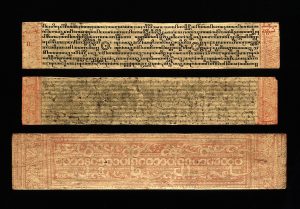
Burmese-Pali Manuscript.
Credit: Wellcome Library, London.
The Tipitaka, or Three Baskets, are the corpus of recorded teachings of the Buddha written in the ancient language of Pali. Reputed to contain approximately 84,000 discourses, it could be said it would take a little while to get familiar with them.
The term ‘Pali’ actually means ‘text’, yet it was a simple translational mistake made years ago that meant that the language used to write the Suttas was actually named Pali in itself.
Tipitaka, in Pali, literally means ‘Three Baskets’ and refers to the three divisions of the Pali Canon:
- The Vinaya Pitaka
- The Sutta Pitaka
- The Abidhamma Pitaka
The Vinaya Pitaka is primarily for ordained Monks & Nuns in the Theravada tradition. It contains regulations for the Sangha or community of Buddhists, rules and advice on conduct, and rituals are included for such things as ordinations etc.
The Sutta Pitaka is likely to be the Pitaka that most lay Buddhists will be interested in. This Pitaka contains the recorded words of the Buddha and some of his disciples. It is vast in scope and touches on every aspect of life, training and thought. It does not however contain every last discourse (or Sutta) as other variant traditions of Buddhism have their own cannon, yet this does not distract from the immense advice that the Buddha gave over his 45 years of teaching.
The Abidhamma Pitaka contains vast tracts regarding the philosophy and psychology of Buddhism. It is very dense and rather heavy going. This Pitaka is for the hard-core Buddhist who is not afraid of having his mental faculties stretched to their limit, and does not mind almost endless lists of facts. I have yet to really tackle the Abidhamma, so I have no advice to give regarding this subject.
Again, for those interested in reading the actual words (reportedly) of the Buddha, I would recommend Wisdom Publications series of books in the series called ‘Teachings of the Buddha‘. They are very high quality translations of the Pali Sutta Pitaka and, as far as I am concerned, cannot be beaten for quality and price.
